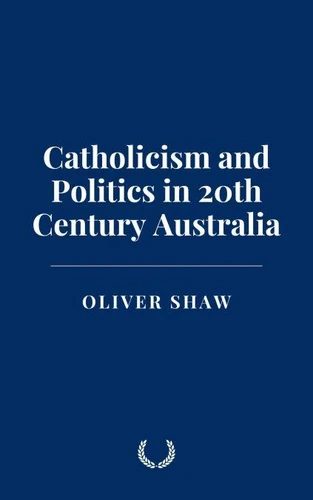Catholicism and Politics in 20th Century Australia
Par :Formats :
Disponible dans votre compte client Decitre ou Furet du Nord dès validation de votre commande. Le format ePub est :
- Compatible avec une lecture sur My Vivlio (smartphone, tablette, ordinateur)
- Compatible avec une lecture sur liseuses Vivlio
- Pour les liseuses autres que Vivlio, vous devez utiliser le logiciel Adobe Digital Edition. Non compatible avec la lecture sur les liseuses Kindle, Remarkable et Sony
 , qui est-ce ?
, qui est-ce ?Notre partenaire de plateforme de lecture numérique où vous retrouverez l'ensemble de vos ebooks gratuitement
Pour en savoir plus sur nos ebooks, consultez notre aide en ligne ici
- FormatePub
- ISBN8230270423
- EAN9798230270423
- Date de parution20/01/2025
- Protection num.pas de protection
- Infos supplémentairesepub
- ÉditeurIndependently Published
Résumé
This book provides an in-depth exploration of the Catholic Church's influence on Australian politics throughout the 20th and early 21st centuries. It traces the Church's historical engagement with key political issues, such as education, social justice, labor rights, and immigration, while examining the evolving dynamics of Church-state relations in a rapidly secularizing and multicultural society.
The book discusses the contributions of prominent Catholic leaders, such as Archbishop Daniel Mannix and Cardinal Norman Gilroy, and examines the rise of Catholic lay movements, particularly post-Vatican II, in shaping the political landscape. It also addresses the challenges posed by the sexual abuse crisis, the Church's responses to contemporary social issues like same-sex marriage and environmental justice, and its role in the ongoing debates surrounding Indigenous rights and refugees.
The Catholic Church's influence on Australian identity and public policy has been significant, particularly in the areas of social justice, education, and welfare. Throughout its history, the Church has been a moral force in shaping the national discourse, advocating for the protection of the marginalized and the promotion of the common good. Through careful analysis of primary sources, historical events, and Catholic social teachings, this work contextualizes the Catholic Church's significant but often contentious position in Australian public life.
Ultimately, it offers a critical assessment of the Church's future in Australian politics, navigating its internal crises, public controversies, and continuing relevance in advocating for social justice, human dignity, and the common good in a changing world.
The book discusses the contributions of prominent Catholic leaders, such as Archbishop Daniel Mannix and Cardinal Norman Gilroy, and examines the rise of Catholic lay movements, particularly post-Vatican II, in shaping the political landscape. It also addresses the challenges posed by the sexual abuse crisis, the Church's responses to contemporary social issues like same-sex marriage and environmental justice, and its role in the ongoing debates surrounding Indigenous rights and refugees.
The Catholic Church's influence on Australian identity and public policy has been significant, particularly in the areas of social justice, education, and welfare. Throughout its history, the Church has been a moral force in shaping the national discourse, advocating for the protection of the marginalized and the promotion of the common good. Through careful analysis of primary sources, historical events, and Catholic social teachings, this work contextualizes the Catholic Church's significant but often contentious position in Australian public life.
Ultimately, it offers a critical assessment of the Church's future in Australian politics, navigating its internal crises, public controversies, and continuing relevance in advocating for social justice, human dignity, and the common good in a changing world.
This book provides an in-depth exploration of the Catholic Church's influence on Australian politics throughout the 20th and early 21st centuries. It traces the Church's historical engagement with key political issues, such as education, social justice, labor rights, and immigration, while examining the evolving dynamics of Church-state relations in a rapidly secularizing and multicultural society.
The book discusses the contributions of prominent Catholic leaders, such as Archbishop Daniel Mannix and Cardinal Norman Gilroy, and examines the rise of Catholic lay movements, particularly post-Vatican II, in shaping the political landscape. It also addresses the challenges posed by the sexual abuse crisis, the Church's responses to contemporary social issues like same-sex marriage and environmental justice, and its role in the ongoing debates surrounding Indigenous rights and refugees.
The Catholic Church's influence on Australian identity and public policy has been significant, particularly in the areas of social justice, education, and welfare. Throughout its history, the Church has been a moral force in shaping the national discourse, advocating for the protection of the marginalized and the promotion of the common good. Through careful analysis of primary sources, historical events, and Catholic social teachings, this work contextualizes the Catholic Church's significant but often contentious position in Australian public life.
Ultimately, it offers a critical assessment of the Church's future in Australian politics, navigating its internal crises, public controversies, and continuing relevance in advocating for social justice, human dignity, and the common good in a changing world.
The book discusses the contributions of prominent Catholic leaders, such as Archbishop Daniel Mannix and Cardinal Norman Gilroy, and examines the rise of Catholic lay movements, particularly post-Vatican II, in shaping the political landscape. It also addresses the challenges posed by the sexual abuse crisis, the Church's responses to contemporary social issues like same-sex marriage and environmental justice, and its role in the ongoing debates surrounding Indigenous rights and refugees.
The Catholic Church's influence on Australian identity and public policy has been significant, particularly in the areas of social justice, education, and welfare. Throughout its history, the Church has been a moral force in shaping the national discourse, advocating for the protection of the marginalized and the promotion of the common good. Through careful analysis of primary sources, historical events, and Catholic social teachings, this work contextualizes the Catholic Church's significant but often contentious position in Australian public life.
Ultimately, it offers a critical assessment of the Church's future in Australian politics, navigating its internal crises, public controversies, and continuing relevance in advocating for social justice, human dignity, and the common good in a changing world.























